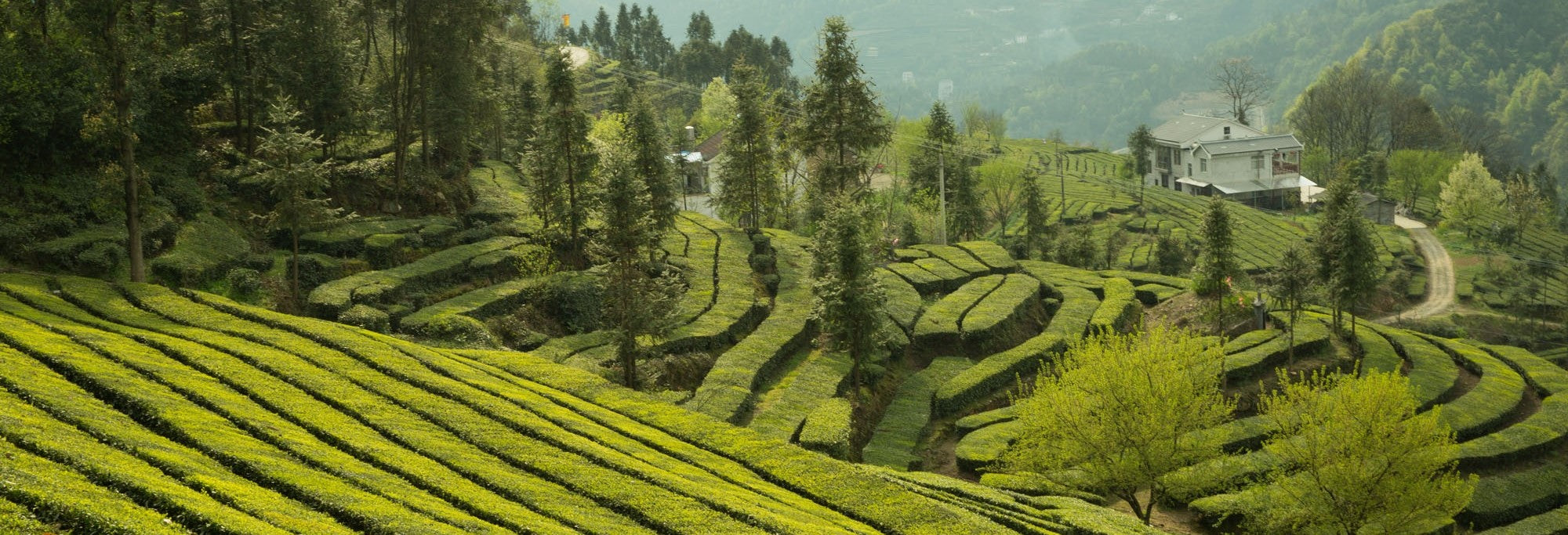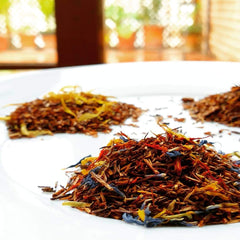Ethical Tea Sourcing, Carbon Offsetting & Packaging

We Source from the Ethical Tea Partnership™

At Matcha Alternatives we are proud to source our teas from Ethical Tea Partnership (ETP) tea gardens. In doing so, our teas are carefully sourced from responsible suppliers who are part of this international program dedicated to providing a great product without harming the world in the process.
Where possible we go organic, but rest assured all the ingredients used in our blends are all-natural and free from sugar, dairy, artificial flavorings and colors.
Who is the ETP?
The ETP started in 1997 and aims to create "a fairer, better, more sustainable tea industry for workers, farmers and the environment". The ETP monitors and regulates social conditions on tea estates, including health coverage, housing and childcare, and is audited externally by PwC. Their key themes are:
- Changing lives
- Better incomes
- Empowering women
- Climate & environment
A little more about the ETP:
"The Ethical Tea Partnership (ETP) is a not for profit organisation that convenes the tea industry, development partners, NGOs and governments to improve the lives of tea workers, farmers and the environment in which they live and work. Our priority is to work on long-term programs to tackle the deep-rooted issues and some of the most complex challenges that tea workers and communities are facing.
"To date, we have improved the lives of over 700,000 people in tea communities. By 2020 we will have changed the lives of over one million people.
"The ETP has many of the same goals as Fair Trade, but deals only with the tea industry. Because tea is not a publicly traded commodity, such as coffee, Fair Trade is unable to penetrate many of the nuances and regional peculiarities of the tea trade. Where the ETP also differs from Fair Trade is in primary focus. Fair Trade's primary concern is ensuring sustainable profits for local producers. The ETP on the other hand is a socially and environmentally directed organization."
The above information was obtained through our research, conversations with our suppliers and www.ethicalteapartnership.org
And you can follow them on Twitter @EthicalTea
We hope this helps you feel confident you are doing the honorable thing by only finding and enjoy tea from reputable suppliers.

What Packaging do We Use?
We use plastic packaging....why? Because, counter-intuitively, it's better for the environment than glass, foil/metal or paper in terms of carbon footprint.
We wish the science of environmental damage were simple, but with our (i.e. the founders') Geology, Economics and Aquatic Resource Management degrees, and with Elizabeth working in eco-restoration of rivers, lakes and estuaries for many years, we know that it's far from that.
Plastic in the oceans and environment, not correctly disposed of through recycling, leads to immense harm. However, plastic has a much smaller total carbon footprint (sourcing materials, energy use, manufacture transportation etc.) than glass, aluminum, paper or carton.
This is mainly because energy generation and use is the leading cause of carbon dioxide production from human activity, and these other materials take much more energy per gram or unit. It makes sense when you think about it (and research it) - it takes a lot of energy to mine and melt bauxite into aluminum, or mine and melt sand, limestone and soda ash to make glass. Remembering too that energy is required every time it's recycled further adds to the carbon footprint. And that's not even discussing the environmental devastation caused by open pit mining, or the working conditions, often appalling.
There are other issues that increase the CO2 footprint of glass, paper and aluminum as well. For example, glass is costly to ship as it is heavy, and also very breakable resulting in greater product wastage. Because it needs protective packaging, far less of a product can be shipped in glass (think of how much you can fit in a shipping container if it's packed in glass vs plastic).
For paper, growing and processing timber, even sustainably, releases large amounts of CO2 from the ground. Plus, paper-based packaging for food and drink always require a plastic liner anyway, which serves to make them look or appear 'greener' to customers rather than avoiding plastic. In fact, the plastic liner, or multiple layers of composite even when it feels or looks like only paper, makes it more challenging or simply impossible to recycle. Most towns and regions do not have cutting edge recycling plants able to handle all types of material, so even if something is *technically* possible to recycle, having access to a recycling center that can physically do it and turn a profit is much less common.
For foil packaging, the mining of bauxite has an enormous carbon footprint, pollutes local surface and groundwater resources, and permanently scars the environment.
So we have a dilemma: which is better? Packaging our tea in glass, paper (with plastic liners), aluminum or plastic?
No packaging comes without an environmental cost, so it's a balancing act: Pollution or higher carbon footprint? What impact will our tea packaging have on the world?
If we were selling tea near a major world river such as the Nile or Ganges, we would be aware that due to established customs and availability of recycling plants, large amounts of plastic would end up in the river, posing significant problems from plastic pollution.
However, we are selling our teas in the USA where the likelihood of our plastic packaging ending up in the wild environment or the ocean is near zero, as waste management is very good here.
We also know that you, the tea lover, is also eco-minded and so will properly dispose of such packaging, reusing where you can. We therefore feel that the chances of our packaging ending up as litter or pollution are quite low, which makes reducing our carbon footprint the number 1 priority.
This is why we are confident in stating that, for our eco-priorities (i.e. overall impact on the Earth and trying to mitigate climate change), our choice of packaging is the best one available because of its comparatively small carbon footprint.
Ultimately, and sadly, climate change is our planet's biggest threat and given the above reasons, plastic is the best way to go for Matcha Alternatives. It sounds counter-intuitive, but as this policy description shows, we are scientists above all else. We want to do what's best, not what looks the best. If only our politicians would agree!
If you have any questions about this policy, please Contact Us.
Carbon Offsetting & Reforestation
We went carbon positive in November 2021! This took two years of work. and we have chronicaled our journey in the below blogs:
MatchaAlternatives.com Goes Carbon Positive - Our Teashop’s Journey Part 1: How We Got Here
All the essential questions for our carbon journey: Why are carbon footprints important to us and tea? Why & how have we taken this teashop Carbon Positive? What about criticisms of Offsetting and Tree Planting? Why aren’t we going Carbon Neutral? What does a tea business need to do to be net carbon negative?
MatchaAlternatives.com Goes Carbon Positive - Our Teashop's Journey Part 2: The Big Reveal
Our teashop's Carbon Footprint calculations for going carbon positive! Learn our small business' carbon emissions, how many trees we're planting / tons of carbon we're offsetting. Plus what trees to plant to offset, who to partner with, and how to address the risk of greenwashing as part of being net carbon negative.
We have planted over 1200 trees since 2019!!
...and written a host of blogs to use our platform to spread knowledge and awareness about climate change and the tea industry:
Read our Going Carbon Positive blog series
Loose Leaf vs Teabags: Why Loose Leaf?
While we use plastic packaging, we also try to reduce our use of it (and any packaging) as much as possible. This is one of many reasons we only sell loose-leaf tea, not a teabag in sight. Loose-leaf tea allows you to make larger purchases and also avoids the wasteful scourge of individually wrapped teabags that have unfortunately become so trendy.
Loose-leaf tea can be composted and is of course fully biodegradable. We are also proud to offer our stainless steel tea infusers, as they also reduce waste. Sometimes, though, a teabag is necessary - but it can also be biodegradable, like our DIY bags.
Lastly, teabags often contain plastics, pesticides and dirt from manufacturing, and the tea inside is hard to wash. Looseleaf tea allows you to see what your drinking, rinse it (as you would any fruits and vegetables) and know that you're drinking a plastic and chemical free cuppa.
So...in Summary:

➡ We source our teas from the Ethical Tea Partnership, which is a tea-specific organization focused on both working conditions and the environment
➡ We use packaging with the lowest carbon footprint possible
➡ We actively offset our carbon emissions and each tea bundle sold plants 1 tree
➡ We are strong supporters of reforestation
➡ We only sell looseleaf tea to reduce packaging and plastic pollution
...and we would be honored if you would give our teas a try and support our shop and mission!
~ Elizabeth & Vientiene Taeed, Founders of

References & Further Reading
Ethical Tea Partnership
Our patrons are invited to learn more about the ETP and their successes here:
www.ethicalteapartnership.org/what-we-do/
www.ethicalteapartnership.org/about-us/mission/
Packaging
We have read scientific research papers directly to determine robustness of the research, and also examine published articles. Below you will find a few useful references for some of the more easily accessible articles.The TappWater links below are particularly interesting as they have conducted large meta-studies, which is great to get average base lines. Naturally, and as always, we recommend readers and patrons of MatchaAlternatives.com to conduct their own research on the matter as well.
https://tappwater.co/us/carbon-footprint-bottled-water/; https://tappwater.co/us/footprint-of-glass-vs-plastic-vs-aluminium-best-choice/; https://www.researchgate.net/publication/257679872_Life_cycle_environmental_impacts_of_carbonated_soft_drinks
Carbon Offsetting & Reforestation
Going Carbon Positive blog series, all about our journey to carbon positivity
OneTreePlanted.org & Appalachian tree planting
~
|
for great tea science!
|

